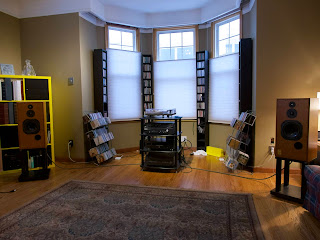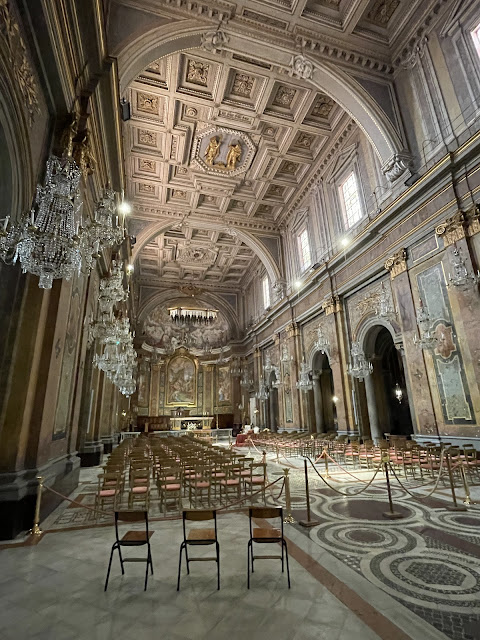Aural Reflection
I had an interesting conversation recently with a very thoughtful person. Our conversation covered many topics, but one that has stuck in my mind concerned the apparent non-attractiveness of religion. It is written about, spoken about and if inertia is any judge it seems to have the support of being a phenomenon.
Throughout my life there has been a thread within Catholicism that seems to think that the problem is somehow based on relevance. Reality is more subtle than that.
Similarly throughout my life I have seen the pace of life increase. Two spouses working, the shrinking of the world through easy transport and mass communications and the increasing number of ways we communicate and share information have all changed the way each of us encounters life.
While we talk about materialism and the consumer culture we live in, we rarely consider what that means. To what extent are we making all our encounters like a commercial transaction? Have we come to expect gratification every time we interact? Once gratified, do we walk away?
Since I've been writing about music and spirituality, how often do we use music as noise to block out relationships?
Relationships do not always gratify. First of all, they demand. We must listen. It was Marshal McLuhan who observed with the onset of television that it was a "cold" medium, one that tends to make us passive. I have to say I find video games can tend in that direction as well. They can be amazingly imaginative, but it is the programmers' imaginations not the players so often that are on display on our screens. When my nephew was young he was collecting "magic beans" in his Harry Potter game and now that he is older, he is collecting armour. Admittedly as an outsider, I find it the same form.
How much are our virtual experiences being transferred to our real ones? Real relationships demand that we listen. Sometimes we even have to change our habits. And great things happen in this qualitatively more human kind of exchange. Our vantage point changes.
In my conversation one idea that was brought up was that people may not feel the need of the Church and that social structures are less trusted. I wonder if they are being replaced with other structures. It just happens that some of them are software. Some of them are shopping malls. Some of them are more mediated relationships that people have online. Even here in this blog, I don't have interactive options on, because I don't have the time in my life to respond to them. All media do have certain structure. We can't function socially without it.
I hope that it is not just that I am 51 years old, but I am sensing some dangers in our present social environment. Our fascination with celebrity and our appetite for juicy information could be pushing us away from our own deeper longings for meaningful relationships and for transcendence.
If this is true, then how can not only the message of the Gospel but the demanding reality of living in a community of faith seem attractive. Certainly I don't think "relevance" is the key. Realism might just be better. For so many, throughout the history of Christianity, it has been an experience of what is real that has brought them to faith or to deeper faith. For those of us trying to share Christ's message with the world then, perseverance in striving to live an authentic life must be front and centre.
Having said that, if any of us become self-satisfied with a more superficial way of living it will be very difficult. Even St. Paul, whose conversion was most extraordinary, was first a person of faith -- misled, even venomous, but clearly in search of the holy.
 Why does an artist paint? Why do musicians play music? Attention is required. But attention is not the purpose alone. In paying attention, the artistry speaks and always (among other things) of the heart of the artist. To respond to art is to engage our emotions, intelligence and imagination and with some contemporary art we are even kinetic, i.e., we have to get physically active, to properly relate to it.
Why does an artist paint? Why do musicians play music? Attention is required. But attention is not the purpose alone. In paying attention, the artistry speaks and always (among other things) of the heart of the artist. To respond to art is to engage our emotions, intelligence and imagination and with some contemporary art we are even kinetic, i.e., we have to get physically active, to properly relate to it.
As with all relationships, within the community of the Church there are all sorts of imperfections that are products of the members of the Church. And that is why any social structure requires participation from its members. This is not really demanded of us when we are simply buying something. And with many of social media that we use, we have the luxury of writing our own publicity without the kind of corrective that I experienced, for example, from the kids in the neighbourhood where I grew up who knew me better than I knew myself.
Deep relationships and deep commitments can be fruitful or frightening. Think of a great piano prodigy like Lang Lang who has devoted his life to his art. What a gift to the world! On the other hand, if we get involved in deep relationships that are seriously flawed and we are blind to it, then bad things can happen. The divorce rate in Canada is around 40%. The sheer odium that the memory of the Third Reich or the excesses of Stalin invoke make us rightfully fearful of anything that smacks of totalitarianism.
But to be truly free is not merely to have license. To be free is to be good; to be able to receive love with gratitude and to be able to return it with generosity. It is to make our contribution to the good of others without claiming entitlements because of it. It is to live with a certain "disponibilite" or openness to use the term of the French philosopher Gabriel Marcel.
And as a Christian it is my belief that grace is everywhere present when this happens and that grace will draw us to the revelation, the realization of God's love through his real Son, Jesus.
Begin with longing what is deep and true. And then listen, within the silence and to the subtle harmonies and resonances that happen in real human relationships and whenever we authentically share our lives.
Throughout my life there has been a thread within Catholicism that seems to think that the problem is somehow based on relevance. Reality is more subtle than that.
Similarly throughout my life I have seen the pace of life increase. Two spouses working, the shrinking of the world through easy transport and mass communications and the increasing number of ways we communicate and share information have all changed the way each of us encounters life.
While we talk about materialism and the consumer culture we live in, we rarely consider what that means. To what extent are we making all our encounters like a commercial transaction? Have we come to expect gratification every time we interact? Once gratified, do we walk away?
Since I've been writing about music and spirituality, how often do we use music as noise to block out relationships?
Relationships do not always gratify. First of all, they demand. We must listen. It was Marshal McLuhan who observed with the onset of television that it was a "cold" medium, one that tends to make us passive. I have to say I find video games can tend in that direction as well. They can be amazingly imaginative, but it is the programmers' imaginations not the players so often that are on display on our screens. When my nephew was young he was collecting "magic beans" in his Harry Potter game and now that he is older, he is collecting armour. Admittedly as an outsider, I find it the same form.
How much are our virtual experiences being transferred to our real ones? Real relationships demand that we listen. Sometimes we even have to change our habits. And great things happen in this qualitatively more human kind of exchange. Our vantage point changes.
In my conversation one idea that was brought up was that people may not feel the need of the Church and that social structures are less trusted. I wonder if they are being replaced with other structures. It just happens that some of them are software. Some of them are shopping malls. Some of them are more mediated relationships that people have online. Even here in this blog, I don't have interactive options on, because I don't have the time in my life to respond to them. All media do have certain structure. We can't function socially without it.
I hope that it is not just that I am 51 years old, but I am sensing some dangers in our present social environment. Our fascination with celebrity and our appetite for juicy information could be pushing us away from our own deeper longings for meaningful relationships and for transcendence.
If this is true, then how can not only the message of the Gospel but the demanding reality of living in a community of faith seem attractive. Certainly I don't think "relevance" is the key. Realism might just be better. For so many, throughout the history of Christianity, it has been an experience of what is real that has brought them to faith or to deeper faith. For those of us trying to share Christ's message with the world then, perseverance in striving to live an authentic life must be front and centre.
Having said that, if any of us become self-satisfied with a more superficial way of living it will be very difficult. Even St. Paul, whose conversion was most extraordinary, was first a person of faith -- misled, even venomous, but clearly in search of the holy.
 Why does an artist paint? Why do musicians play music? Attention is required. But attention is not the purpose alone. In paying attention, the artistry speaks and always (among other things) of the heart of the artist. To respond to art is to engage our emotions, intelligence and imagination and with some contemporary art we are even kinetic, i.e., we have to get physically active, to properly relate to it.
Why does an artist paint? Why do musicians play music? Attention is required. But attention is not the purpose alone. In paying attention, the artistry speaks and always (among other things) of the heart of the artist. To respond to art is to engage our emotions, intelligence and imagination and with some contemporary art we are even kinetic, i.e., we have to get physically active, to properly relate to it. As with all relationships, within the community of the Church there are all sorts of imperfections that are products of the members of the Church. And that is why any social structure requires participation from its members. This is not really demanded of us when we are simply buying something. And with many of social media that we use, we have the luxury of writing our own publicity without the kind of corrective that I experienced, for example, from the kids in the neighbourhood where I grew up who knew me better than I knew myself.
Deep relationships and deep commitments can be fruitful or frightening. Think of a great piano prodigy like Lang Lang who has devoted his life to his art. What a gift to the world! On the other hand, if we get involved in deep relationships that are seriously flawed and we are blind to it, then bad things can happen. The divorce rate in Canada is around 40%. The sheer odium that the memory of the Third Reich or the excesses of Stalin invoke make us rightfully fearful of anything that smacks of totalitarianism.
But to be truly free is not merely to have license. To be free is to be good; to be able to receive love with gratitude and to be able to return it with generosity. It is to make our contribution to the good of others without claiming entitlements because of it. It is to live with a certain "disponibilite" or openness to use the term of the French philosopher Gabriel Marcel.
And as a Christian it is my belief that grace is everywhere present when this happens and that grace will draw us to the revelation, the realization of God's love through his real Son, Jesus.
Begin with longing what is deep and true. And then listen, within the silence and to the subtle harmonies and resonances that happen in real human relationships and whenever we authentically share our lives.

